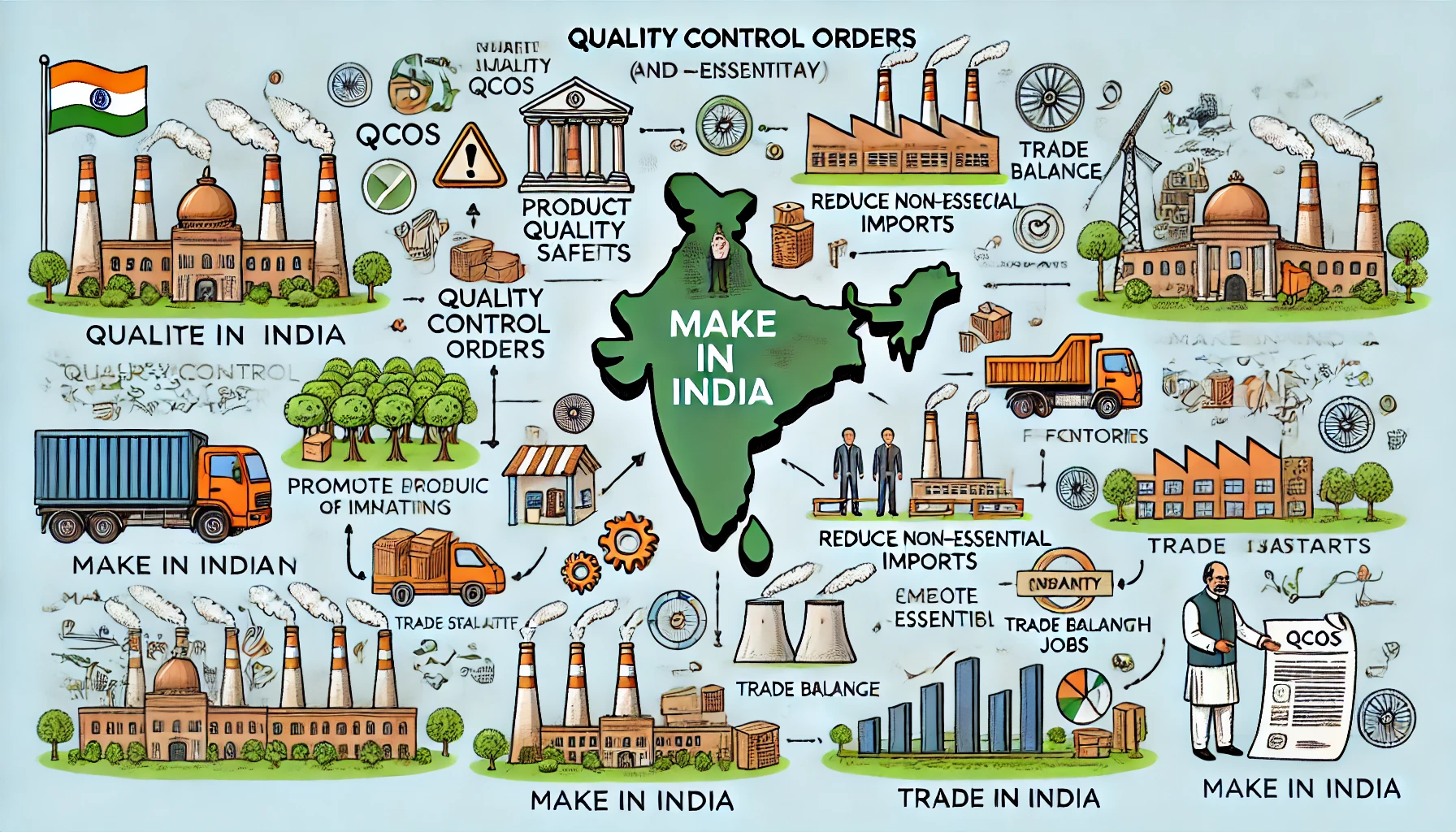The Quality Control Orders (QCOs) are a critical part of India’s strategy to promote the Make in India initiative and achieve the goals of Atmanirbhar Bharat. These orders, issued under the framework of Technical Barriers to Trade (TBT) as recognized by the WTO, are designed to regulate imports, encourage domestic manufacturing, create employment, and maintain a healthy trade balance. QCOs are specifically issued to address concerns related to quality, safety, and environmental protection, ensuring that products meet stringent standards that benefit both consumers and the economy.
- Role of QCOs for Quality, Safety, and Environmental Protection
QCOs mandate compliance with National Standards framed by BIS (Bureau of Indian Standards) to ensure that products manufactured or imported into India adhere to specific technical requirements. These focus on:
- Quality Assurance: Ensuring that goods meet the prescribed standards of durability, reliability, and performance, enhancing consumer confidence.
- Safety Standards: Protecting consumers from substandard or hazardous products, such as electrical appliances or construction materials.
- Environmental Sustainability: Encouraging eco-friendly manufacturing practices by setting benchmarks for energy efficiency, emissions, and waste management.
- Role of QCOs as TBT
QCOs also act as a Technical Barrier to Trade (TBT), serving legitimate regulatory purposes while indirectly supporting domestic industries.
- Restricting Substandard Imports: By enforcing strict quality norms, QCOs prevent the entry of low-quality and non-essential goods into the market.
- Encouraging Domestic Alternatives: Indian manufacturers are incentivized to produce high-quality substitutes for imported products, reducing reliance on foreign goods and fostering self-reliance.
- Promoting Make in India
QCOs play a vital role in advancing the Make in India initiative, encouraging investment in domestic manufacturing and improving global competitiveness.
- Stimulating Manufacturing: Enforcing stringent standards compels industries to innovate and improve, promoting the production of world-class goods.
- Enhancing Brand Value: High-quality domestic products bolster India’s reputation in international markets, strengthening the Make in India vision.
- Strengthening Local Ecosystems: By reducing dependence on imports, QCOs support the development of robust domestic supply chains.
- Maintaining a Healthy Trade Balance
QCOs also help maintain a favorable trade balance by acting as barriers to non-essential imports.
- Reducing Trade Deficit: Limiting low-quality imports reduces the volume of imported goods and lowers the trade deficit.
- Encouraging Exports: Products meeting QCO standards are more likely to comply with global quality norms, enhancing export potential and trade balance.
- Creating Employment Opportunities
The implementation of QCOs directly supports job creation through the expansion of domestic industries and ancillary services:
- Expanding Local Manufacturing: Increased demand for locally produced quality goods drives industrial growth, creating direct and indirect employment.
- Upskilling Workforce: Compliance with QCOs necessitates training workers to meet advanced technical standards, fostering a skilled labor force.
- Boosting MSMEs and Startups: MSMEs are encouraged to adopt quality norms, leading to job creation and economic growth.
- Protecting Consumers and Promoting Sustainability
QCOs ensure that consumers are protected and the environment is safeguarded through:
- Consumer Safety: Stringent standards protect users from unsafe and unreliable products.
- Eco-Friendly Practices: QCOs often include requirements for energy efficiency, waste reduction, and sustainable resource use, encouraging manufacturers to adopt environmentally friendly practices.
- Examples of QCO Implementation
- Steel Industry: QCOs mandate the use of BIS-certified steel, ensuring quality and safety in construction while reducing reliance on imported steel.
- Electronics and IT Products: QCOs enforce standards for electronic goods, encouraging local assembly and manufacturing while ensuring consumer safety.
- Chemicals and Plastics: These QCOs focus on reducing environmental hazards and ensuring the safety of chemical products.
- Alignment with WTO and TBT Agreement
While QCOs serve as TBTs, they adhere to the WTO’s principles by:
- Legitimacy of Objectives: Focusing on quality, safety, and environmental protection.
- Non-Discriminatory Practices: Applying the same standards to both domestic and imported products, ensuring fairness.
Conclusion
QCOs are an essential tool for India’s economic and regulatory framework. By prioritizing quality, safety, and environmental concerns, they protect consumers and foster sustainable development. Additionally, QCOs regulate non-essential imports, maintain a healthy trade balance, and stimulate domestic manufacturing. Through these measures, QCOs drive the Make in India initiative, promote self-reliance, and position India as a global leader in manufacturing and trade.


For your Certification needs pls contact:
OMEGA QMS PVT. LTD.
908-909, Hemkunt House, Rajendra Place, New Delhi-110008, India
Email: info@globalomega.com, Phone: 011-41413939(100 lines)

